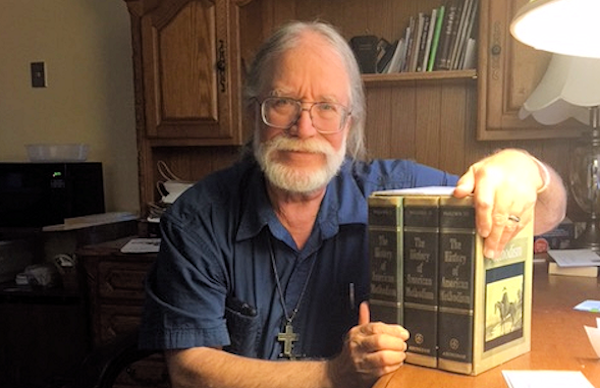Victor Asbury puts the Bible and Prison Ministry in the center of his seminary studies.
KARIN ORR
Michigan Area Communications
If your last name is “Asbury” and you are studying for the ministry, chances are you might be a United Methodist. For Victor D. Asbury, Jr., however, the path is more than a mere coincidence of names. While he is not related to the famous Francis Asbury, Methodism’s pioneering circuit rider, Victor does share the legendary leader’s energetic spirit of servanthood; and he is indeed a United Methodist.
In fact Victor, who resides in Lansing with his wife, Annette, is chair of both the Board of Church and Society and the Conference Committee on Prison Ministry. He also serves on the Tri-County ReEntry Coalition (TReC), which works with ex-offenders coming back into society, and somehow he manages to hold a fulltime position as an Information Technical Programmer Analyst in the Department of Health and Human Services for the State of Michigan. In addition—if you can believe it—Victor is a student at Calvin Theological Seminary in Grand Rapids, and this is where his story gets even more interesting.
While working toward a Master of Arts degree in Bible and Theological Studies, Victor learned about Calvin’s CPI (Calvin Prison Initiative) program. A recently accredited, four-year course of study for a Bachelor of Arts degree in Ministry Leadership, the program is offered to inmates at the Richard A. Handlon Correctional Facility in Ionia. (Inmates from any of the State’s thirty-one prisons can apply; but once they are admitted to the program, they are transferred to Handlon. To learn more about CPI, click here.
The aim of CPI, as Victor explains it, is to cut down on recidivism and to change prison culture from the inside. And that’s something he cares about deeply. An ex-offender himself, Victor shares how he came to faith and to his passion for prison reform through his wife, Annette. “When I first met Annette, she was on her way to prison, and she asked me to pray for her,” Victor recounts. Though he had been raised Methodist and had been through everything from MYF (Methodist Youth Fellowship)) to Boy Scouts and a “God and Country” award, Victor, a college student at the time, felt rather agnostic.
“But I thought, ‘Why not?’” Victor confesses. “It wasn’t going to cost me anything to pray, so I might as well pretend that it was real.” Somewhere, though, while he was pretend praying on one of his long trips to visit Annette in prison, something happened. Victor had an experience similar to John Wesley’s “preach faith until you have it!” and everything changed. “It was December 29, 2001, at 11:52 A.M.,” Victor remembers. “I said: ‘OK, God; if you want me I’m yours!’ By the time I reached my friends, my feet were hardly touching the ground.”
The next step was studying the Bible and going to church—but not just any church. Victor picked what Annette called “his church,” Asbury United Methodist on Lake Lansing Road. “The day I walked through the door was one of the scariest of my life,” Victor remembers. “I’d slip in and out, but Reverend Deb Johnson maneuvered to intercept me. She’s my mentor and friend,” he adds. “We had far-reaching conversations about faith and theology,”
Those discussions led to Victor’s facilitating Bible studies and, eventually, his enrolling in seminary. “In the Bible Study, people were asking questions,” Victor says, “and I wanted to answer them, but I couldn’t.” At this point Victor recalls feeling like an outsider, a predicament prison students often encounter because they can’t understand “Christianese.” This is Victor’s term for the specialized jargon scholars of religious studies share. “It makes the prisoners feel ‘less than,’” Victor explains, “and the classes help.”
While Victor is grateful for the opportunities and support he received in overcoming the obstacles he faced, he is concerned about all those inmates who have nothing, who are caught in a nightmarish cycle from which it’s almost impossible to escape. “Upon release, an ex-offender has three days to get an ID, or it’s a felony,” he relates. “To get an ID, you have to have an address, a home. To get a home, you have to have money, a job. But many employers, once they see that box marked ‘felon,’ won’t hire you. On top of that, there are booking fees, court costs, and restitution to be paid.”
While many of our churches and other helping institutions are working to address these issues, effective prison reform takes time, money, and the willingness to treat prisoners like human beings, beloved by God, no matter what they have done. However, there is a simple and direct way you, dear reader, can help immediately: donate books!
Part of Calvin’s CPI mission is setting up a prison library at Handlon. Books on theology and ministry are especially appreciated. “They assure me that the students are just as interested in books on Wesley and the UMC as they are in any other aspect of Christianity and ministry,” Victor says with a smile. Although he understands that it is difficult for clergy to let go of any part of their personal libraries, he also figures a cause like this just might make it easier. “It’s a good investment in our society,” Victor affirms, and it might also bring added benefits. “I know one pastor’s wife who is very happy with me that the books are going out of the house,” Victor grins.
If you would like to do a little “humanitarian housecleaning,” please contact Victor at [email protected] or call (517) 599-2508. He will make sure that your beloved books find a useful new home.
Last Updated on October 27, 2023

